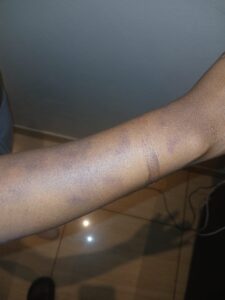By: Hadebe Hadebe
Hypocritical South African media and its friends overseas decided to visit the black woman who looked after the kids of a white family that decided to kill them in New Zealand. The plight of domestic workers is not a concern as it sponsors white privilege and high standards of life.
According to the International Labour Organization (ILO), ten years after the adoption of its historic convention that confirmed their labour rights, “domestic workers still fight to be recognised as workers and essential service providers”.
A South African doctor couple and its three kids recently moved to New Zealand. Obviously leaving the helper behind. There is a likelihood that the helper was left destitute because many of them are poorly paid and enjoy no social protection. As per the Pay and Working Conditions for Domestic Workers Report for 2021 by SweepSouth, domestic workers earn between R2,614 and R2,916 a month. South Africa’s national minimum wage is R20 per hour or R3,520.
When the father returned from work he found their three children lifeless and immediately alerted neighbours. Probably the family left S. Africa on claims that they wanted safety for themselves. But they had supposedly exposed their worker to extreme poverty, and slave labour. The wife was subsequently arrested and taken to police custody as the prime suspect. She allegedly killed the kids out of frustration (undisclosed). Many white South Africans have reasons to defend this heinous act, just because whites are naturally good.
One commentator on Facebook claimed that the wife may have found it difficult looking after the kids without assistance of the helper… That is exactly the notion of white privilege comes in; many whites in South Africa grew up in secure environments with slaves working for them. Safe environments assisted whites to forge ahead at the expense of black workers whom they underpay in their roles as perpetual slaves. Domestics in South Africa live in modernised slavery in many homes. They are yet to realise freedom, not yet uhuru!
The wife had obviously “sacrificed” her career to move to a place of promise – New Zealand. For the first time, she didn’t have a helper, gardener and luxury. She had to live a “normal” life as a human being and without access to slaves, and white privilege. The point that is often disregarded is that white and upper class families enjoy top living standards that are subsidised through the exploration of black labour as domestics and gardeners. This something that does not get acknowledged in public circles and discussions. Black families are now worst exploiters.
Attempts by government to establish and or raise the national minimum wage are fiercely opposed. And media, activists and human rights groups are quiet as the debate rages. The report by News24, among others, on the lady who cared for the kids is disingenuous as no one really cares about domestics. The headline article says former nanny Mandi Sibanyoni is “’devastated’ after 3 SA children found dead in their New Zealand home”. The question is: Why is she relevant in all of a sudden? Media houses rarely cover the abuse of labour rights of domestic workers.
The nanny Mandi Sibanyoni is probably among many domestic workers who flock Pretoria’s eastern suburbs from the former KwaNdebele each morning. This is a phenomenon that can be observed across urban South Africa where people exit townships and rural areas every morning to work in homes of their privileged, recalcitrant countrymen. Black workers remain largely in the periphery of the economy where they serve as cheap labour and face a low ceiling corporate ceiling. The transformation states in companies have not moved after 27 years of democracy. The situation is much worse for low-level workers in retail, mining, construction, and, of course, in households.
The former homeland of KwaNdebele, Sibanyoni’s probable place of origin, lies about seventy kilometres from her work but public transportation is woeful and adds to stresses of work. Men and women leave their homes in neighbourhoods such as Siyabuswa, Marble Hall and Dennilton at 3:30 am to get to work on time where they are paid a pittance. Inequality in South Africa is said to be amongst the highest in the world. Domestics occupy the bottom of the food chain. They rank as most vulnerable and worst paid.
Sibanyoni and her peers ride on tatty buses and taxis that drive on the deadly Moloto Road which links Mpumalanga province and Pretoria. Many workers have lost lives over the years… there is no outrage. Economist Ha-Joon Chang once criticised the apartheid spatial planning and public transport in South Africa. Chang argues that a South African black worker spends an average six hours per day on the road and reasons that this easily impacts his or her productivity. He says the taxis are owned by “gangsters” who charge them an arm and a leg to get to work. Unfortunately, they have no option in the absence of infrastructure and will to solve the problem.
Stellenbosch University’s Margot Strauss concurs that race-based spatial planning formed a cornerstone of the colonial and pre-apartheid governments. The long-term impact on the life of a black worker is staggering since the mostly black residential areas are located far and are also not integrated to the already inadequate public infrastructure. Even young professionals face realities as their low-wage earning parents, which means that poverty is intergenerational. A commuter from Zone 7 in GaRankuwa in northwest of Pretoria easily parts with R100 a day on transport alone.
As the media continues to talk about the emigrated doctors and their children’s connection with their nanny, it omits to say that Sibanyoni probably didn’t have a decent salary and wages while employed by the family to clean, cook and tender their three kids. All her money was spent on transport and it never got to care for her family. She is forever trapped in poverty that is centuries old. The tough conditions faced by the domestic workers are concealed in the leafy suburbs, and no one is bothered by the gloomy faces that we pass on the road daily waiting for the busses to get home.
Where is the media to investigate slave conditions that domestic workers like Sibanyoni work under in most South African homes? They are poorly paid, beaten and sexually exploited by employers. Yet they only feature and good enough to corroborate a story about her former employer who probably didn’t care. Public discourses in South Africa have dumped the protection of vulnerable workers on government while their employers post on social media. Public intellectuals, economists and commentators overly focus on the “expensive” NMW and neglect what it seeks to address.
From politicians to well-paid professionals who have helpers at home, none can claim to be concerned about the well-being of domestic workers. Trade unions also turn a blind eye. At multilateral level, the ILO has a convention for domestics but this remains in a back burner of all society. Almost everyone is responsible for abusing labour rights of domestic workers. Even in homes of diplomats, executives and ministers, domestics do not have it easy and are trapped in a state of non-recognition as workers. Most people refuse to accept that domestic work is work like any other, and that these workers deserve to be paid decent wages.
Wage disparities in the South African economy subsidise high standards of living that upper classes enjoy. Although there are no econometric calculations to prove evidence, but it is evident that poor salaries paid to domestics reduce home running costs in homes. For example, the ILO data suggests that “these workers lost their jobs in greater numbers or saw their hours of work reduced to a greater extent than other parts of the workforce.” Clearly, domestic workers enjoy no protection and are first to go during the tough economic times. And many die or get injured while trying to earn a living.
In South Africa paying a mere R3500 a month plus benefits to workers is a problem. However, the pompous employers lead in getting expensive cars, booze and so on. The weepy employers are members of trade unions themselves where they work; and continuously demand better pay. Their conspicuous consumption agenda appears not include spending on their domestic workers.
Decent pay for workers is a nuisance for many people. In his essay ‘Why the Bangladeshi taka is now the South African rand’s most important cross-rate’ (Daily Maverick, 01/09/2021), Michael Power argues for a reduction of the NMW to be compatible with the Bangladeshi taka or the maloti in Lesotho. Economists like Power act like newbies in Manhattans – South Africa is nether Lesotho nor Bangladesh with its two economies: one very developed (mini Europe) and another underdeveloped (small Abdullahpur in Dhaka). Maybe with the exception of Latin America and parts of the US, there are very few places like South Africa in the world.
Again, what many opinion makers forget is that the poorly paid workers prop the formal economy as a saving on labour costs. This assertion supports my long held view that South Africa has no informal economy but the so-called township economy is an extension of the formal economy. Thus, all productive units are lined up to support the advanced sectors of the formal economy. The positioning of domestic workers was, and still is, conceptualised to making inputs costs low and affordable in the repressive formal economy which includes the households of those manage and benefit from the organised economy.
Apartheid continuities continue unabated under democracy, and the members of the formerly oppressed black majority see no reason of eradicating them.
Domestic workers have families too; they would also like to send their kids to school and to say “dankie mpilo” on Facebook and other social after getting paid well. This is not possible because an economy without slaves won’t afford a privileged few high living standards. As heads of families, why don’t women speak out against the abuse of domestic workers by their peers? Home management is still very much in the hands of women; so they could be abusers of nannies. This violence remains grossly under reported and abusers go unpunished.
The situation gets even more complicated with the influx of African migrants who come to South Africa seeking a living. They are employed at homes under war-like conditions where they are denied basic rights. They have nowhere to report because of their dubious migration statuses.
Overall, domestics get a raw deal in society since they are treated as “invisible workers” – they are not afforded the same rights as other workers and their working environment makes it difficult to see them getting attention.
For as long as South African refuse to talk about the worst employment conditions under which domestics and other vulnerable workers operate, there will be no social justice. And other forms of justice will remain unattainable.
Siya yi banga le economy!








[…] Also read: Poor pay for domestic workers subsidises lifestyles of upper classes […]